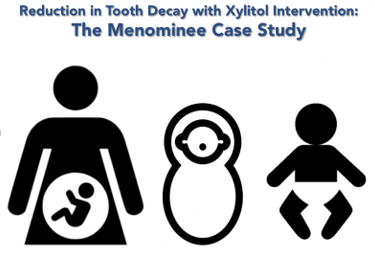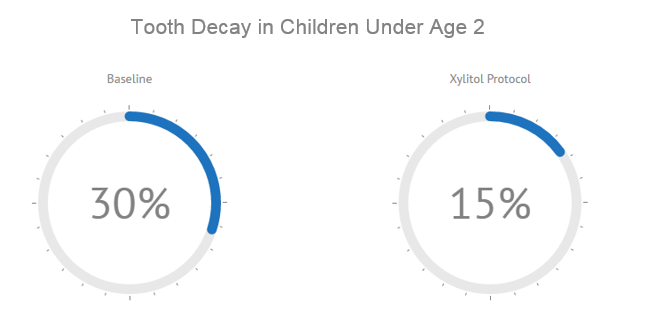
19 Jan The Menominee Xylitol Program – A Case Study
This study was performed by Tammy Keller, BSDH, RDH with the Menominee Tribe in Wisconsin.
Read the study and amazing results she found.
Overview:
The Menominee Dental Department followed pregnant women starting with their third trimester and continued until the child was two years of age. Xylitol products, oral health education, dental exams and cleanings were used to reduce tooth decay in children under the age of two. At the end of two years the study showed a decrease in the amount of tooth decay in children whose mother used xylitol products compared to the baseline data of Head Start Children under the age of two.
The Study:
The xylitol target population was to include 30-40 expectant mothers in their third trimester of pregnancy. At the end of the program, the program had 61 women enrolled in the program. Of the 61 women in the program, 22 of them were first time mothers. The Menominee Tribal Dental Department used educational and preventive dental care along with daily use of xylitol products which included gum, mints, toothpaste, rinse, and wipes to reduce tooth decay in children under the age of two. Oral health education sessions were scheduled with each participant one month after starting the program and then follow-up educational sessions along with dispensing additional xylitol product were made every three months. A pre/post test was given to each participant at their third oral health education session to evaluate effectiveness of oral health materials.
Throughout the program participants continued to receive oral health education materials. The pre-post test used to measure participants oral health knowledge showed that oral health sessions increased participant’s oral health knowledge. Most participants commented on the usefulness of the education received on infant oral health care, nutritional information and use of xylitol products.
The Results:
There was clearly a decrease in the amount of tooth decay in the children who participated in the xylitol program as compared to those children of non-compliant mothers and children examined in the Early Head Start Program. The data gathered from the 27 infants six to twenty- four months of age that participated in the program show a 15% decay rate. The Xylitol children’s rate of decay is 50% lower than the decay rate in the Early Head Start Program (30%).
Conclusion:
Although the study needs to be followed for more years with additional participants, this early result indicates that xylitol is helpful in reducing early childhood caries. The data clearly show a need for early education and prevention programs.

